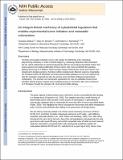An Integrin-Linked Machinery of Cytoskeletal Regulation that Enables Experimental Tumor Initiation and Metastatic Colonization
Author(s)
Shibue, Tsukasa; Brooks, Mary W.; Weinberg, Robert A
Downloadnihms524957.pdf (8.971Mb)
PUBLISHER_CC
Publisher with Creative Commons License
Creative Commons Attribution
Terms of use
Metadata
Show full item recordAbstract
Recently extravasated metastatic cancer cells use the Rif/mDia2 actin-nucleating/polymerizing machinery in order to extend integrin β1-containing, filopodium-like protrusions (FLPs), which enable them to interact productively with the surrounding extracellular matrix; this process governs the initial proliferation of these cancer cells. Here, we identify the signaling pathway governing FLP lifetime, which involves integrin-linked kinase (ILK) and β-parvin, two integrin:actin-bridging proteins that block cofilin-mediated actin-filament severing. Notably, the combined actions of Rif/mDia2 and ILK/β-parvin/cofilin pathways on FLPs are required not only for metastatic outgrowth but also for primary tumor formation following experimental implantation. This provides one mechanistic explanation for how the epithelial-mesenchymal transition (EMT) program imparts tumor-initiating powers to carcinoma cells, since it enhances FLP formation through the activation of ILK/β-parvin/cofilin pathway.
Date issued
2013-09Department
Massachusetts Institute of Technology. Department of Biology; Ludwig Center for Molecular Oncology (Massachusetts Institute of Technology)Journal
Cancer Cell
Publisher
Elsevier
Citation
Shibue, Tsukasa et al. “An Integrin-Linked Machinery of Cytoskeletal Regulation That Enables Experimental Tumor Initiation and Metastatic Colonization.” Cancer Cell 24, 4 (October 2013): 481–498 © 2013 Elsevier Inc
Version: Author's final manuscript
ISSN
1535-6108